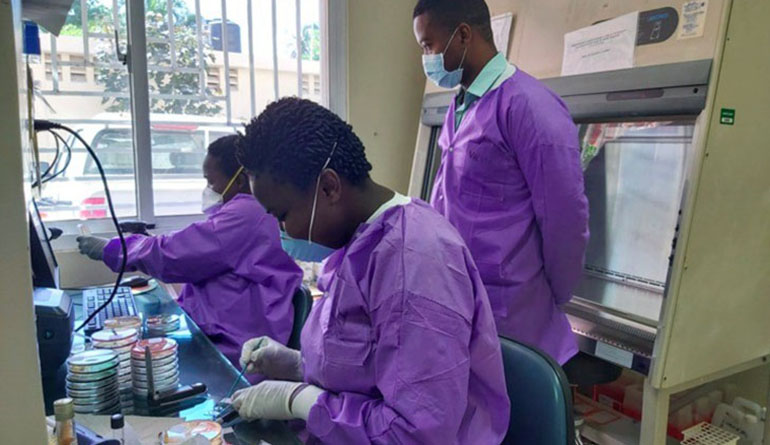News / 30 March 2021
Back to all news
Compared with 352,033 suspected cholera cases and 2,927 deaths reported in 2011, a total of 720 suspected cases and 3 deaths were reported in 2019, including the last laboratory-confirmed cholera case in early February 2019.
The decrease in the annual number of cholera cases has been made possible through the implementation of the National Plan for the Elimination of Cholera in Haiti (2013–2022) by the MSPP and DINEPA alongside partners. To further support these achievements, in 2020, the MSPP – in collaboration with PAHO/WHO, CDC, and the GTFCC Secretariat – started a project funded by the Bill and Melinda Gates Foundation, aimed at strengthening the country’s capacity to quickly detect, confirm, and contain cholera cases and outbreaks.
As part of the project, PAHO/WHO and CDC have provided technical and logistical support to the MSPP for the expansion of the national surveillance system of acute watery diarrhoea (AWD), which to date includes more than 50 health institutions throughout the territory. Furthermore, 162 health professionals from across the country have been trained on the collection and management of specimens from AWD cases. To ensure the timely and accurate detection of cholera cases, assistance is being provided to Haiti’s National Public Health Laboratory (LNSP) through the provision of equipment and supplies, and the training of laboratory technicians on culture and antibiotic susceptibility testing of stool specimens for the detection of Vibrio cholerae. Moreover, PAHO/WHO has provided assistance for the training, equipping, and deployment of Labo-moto nurses.
These are field nurses who have been working on the ground since December 2017 to ensure the timely collection and transport of samples from health institutions to laboratories on motorcycles. In 2020, Labo-moto nurses enabled the testing of 83% of all suspected cholera cases identified in the country. The surveillance system has been strengthened through the integration of assistant epidemiologists in all 10 departmental health directorates to support coordination of alert and response activities, epidemiological investigations, and reporting of epidemic intelligence to health authorities at the central level.
An in-country evaluation of Haiti’s cholera surveillance system conducted by CDC in September 2019 identified several aspects that could be strengthened to improve detection, confirmation, and response to any subsequent cholera cases in a timely manner. In partnership with Pan American Health Organization (PAHO), and with funding from the World Health Organization through the CDC Foundation, CDC is working to improve Haiti’s capacity to quickly detect, confirm, and contain cholera cases and outbreaks. This includes providing equipment, supplies, and remote training to microbiologists at the LNSP to enable molecular testing and ensure more accurate test results, and support for training and a quality assurance program to enable regional laboratories to confirm cholera by stool culture.
CDC is also working to build linkages between epidemiology and laboratory databases that will accelerate data-sharing processes and the response to confirmed cases. Finally, CDC is supporting equipment to improve the reliability, timeliness, and information management of Haiti’s National Specimen Transportation System so it can safely and quickly collect and deliver more specimens for cholera testing to the laboratories. These interventions will carry-over and improve public health capacity to successfully address other diarrheal disease in the long-term.
Strong public health systems need reliable, consistent surveillance to accurately track the circulation and burden of infectious diseases. This project is supporting technical assistance in-country and remotely, to ensure that Haiti’s public health laboratories are adequately trained and equipped to collect, transport, and test specimens, now and in the future and ensure a timely detection, investigation, confirmation and response to any new cholera case in Haiti.
CDC, CDC Foundation and WHO PAHO teams